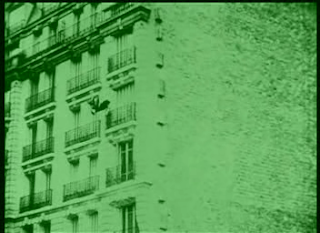The link below is not listed, and therefore, won't show up on Youtube search. That means that I cannot upload it to this blogpost. Still, watch it for it is a revelation:
One
may argue that in the scene above, there are two distinct realities at play –
the first of the smaller mounted camera, and the second of the larger, intimidating
and wholly intrusive (it conveniently juts into the frame of the smaller
camera) camera it is mounted on. The first reality
features a diegetic rendition of a peculiar science-fiction, futuristic
perhaps, magical wide-angle world: there are metallic ramps, fluorescent green
mats covering the windows, shifty walls, large wooden shelves that slide
politely to a side when requested, lamps that dim by themselves and ultimately
strange people (they applaud a magic trick where the card never disappeared and
therefore, cannot reappear). The second reality
is of course, not visible to us at all – we do not have any idea what the
larger camera is recording – or if it is a camera in the first place. It is
therefore, only when we get the opportunity to see the final film in the theatre that we are introduced to an
altogether different reality – one that locates and then disperses meaning in the scene that we never saw
before, a context which wasn’t immediately obvious earlier and an assurance
that the second, larger device is capable of recording. We also realise that
the smaller camera is perhaps the more giving out of two – letting its own
reality be subjugated in the favour of its elder cousin’s.













